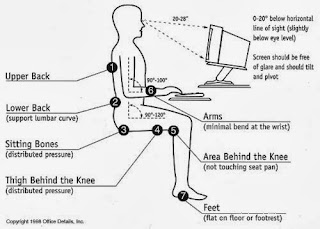I've spoken previously about the muscular effects of sitting for long periods, but if you need a refresh - here it is...
"...okay, I'm getting a hint here - Reed Richards means this is going to talk about stretching somewhere, doesn't it??"
...very good assumption, but let's not get ahead of ourselves here...firstly, what does sitting do to our health?? I'll break it down for you:
...within 15-20 minutes of sitting down: the electrical activity in your muscles drops, and your ability to burn energy drops to about one calorie per minute (think about how little that is in food terms) - which is roughly a quarter of what you would burn if you were just walking...
...after five days of sitting for 6 hours a day: physiological changes will start...your body will drop it's glucose uptake by about 40%, which will eventually cause insulin resistance and may lead to type II diabetes. You can also expect the an increase in blood triglycerides (fat molecules) and LDL (bad) cholesterol...
"...yeah Caolan, for starters - no-one really sits like that - they really sit like this..."
...okay, that's scary - that barely looks human...
...after two weeks of sitting for 6 hours a day: muscle atrophy begins and your maximal oxygen uptake decreases (and you wondered why climbing the stairs was harder)...even if you're exercising every day, the deterioration will still occur as soon as you sit down...
...after a year of sitting for 6 hours a day: you should have experienced weight gain and an increase in your cholesterol levels...if you're female, expect to loss 1% of bone density for every year you're sitting down...
...after 10+ years of sitting for 6 hours a day: by now you will have lost 7 years of quality life...your risk of dying from heart disease is increased by 64%, and your risk of suffering from prostate or breast cancer is increased by 30%...
"...wow, thanks for the doom and gloom..."
...okay, that sounds bad...but there are ways to counteract it...
...the most simple way to counteract the effects of sitting is to make sure that you spend at least an hour of your day standing...that's a solid hour - not 20min and 20min there...this may mean you have to stand in front of your TV and watch your favourite show, or simply get out and walk during your lunch break...
...the second factor is that you need at least thirty minutes of solid activity (notice I said activity, not exercise - this is actually separate from the time you exercise in a day) every day. This might mean walking to work, or at least, setting yourself a longer distance to walk from work to your transport...even ride a bicycle to and from work every day (well, except when the heavens open and make conditions dangerous).
...the final piece of the puzzle for me, is a series of exercises invented by a fellow chiropractor, Eric Goodman, called "The Founder":
...and as always, if you wish to know more: the.chiro@mail.com


































